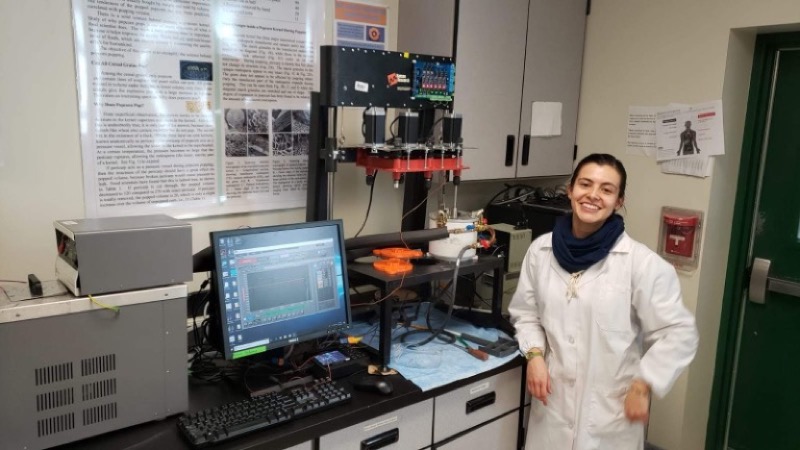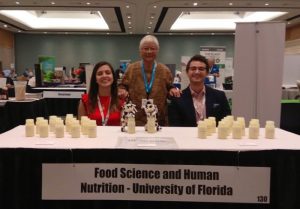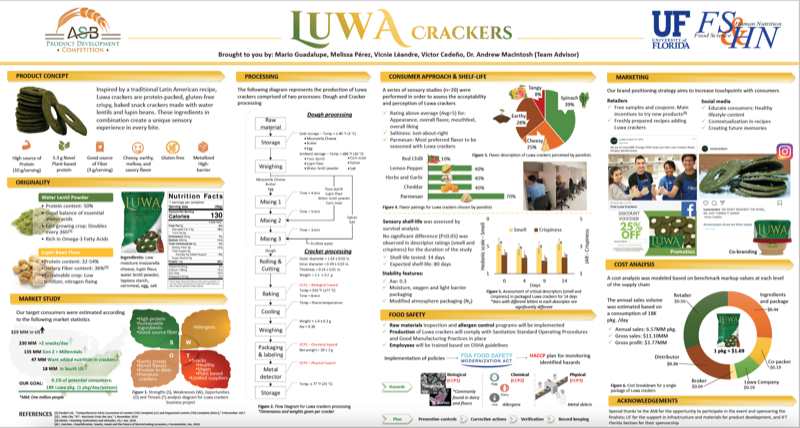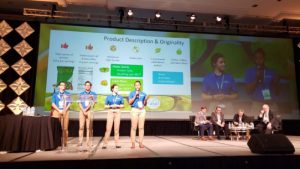 Let’s give a warm welcome to Melissa Perez Santana, a graduate student in the Food Science and Human Nutrition Department at the University of Florida! Read on to learn about how she chose to study at UF, her latest research on high oleic palm oil (HOPO), and the most unusual food she’s ever eaten! (Hint: It’s substANTtial!)
Let’s give a warm welcome to Melissa Perez Santana, a graduate student in the Food Science and Human Nutrition Department at the University of Florida! Read on to learn about how she chose to study at UF, her latest research on high oleic palm oil (HOPO), and the most unusual food she’s ever eaten! (Hint: It’s substANTtial!)
Would you share how you chose the M.S. in Food Science and Human Nutrition program at UF?
From the time I graduated college in 2017, I dreamed of studying food science. A year later, I got the chance to enter a selection process to study fats and oils at UF while completing a Master´s degree in Food Science. I had the fortune to be chosen for the project. It did not take me long to know that UF was the right university to make my dream of being a food scientist come true. From the classes to the type of research performed in the department, to the beautiful open campus, I fell in love with my university.

Would you tell me about your current project with HOPO? How did you become interested in it?
I was born in Colombia, a country where palm oil is a staple crop and a source of income and employment. I became interested in high oleic palm oil (HOPO) when I found out it was an unexplored source of nutrients that can be consumed on daily basis. The potential benefits of HOPO motivated me to research and propose ways to use it. I hope to contribute to better nutrition for people around the world and to the development of growing economies like Colombia.
“Once you enter the world of fats and oils, you want to stay in it.”
My project is focused on exploring the uses of different fractions of high oleic palm oil, focused on baking. We demonstrated that, on average, more than 90% of the micronutrients that make this oil beneficial to health (provitamin A and vitamin E) are retained until the end of the baking. Additionally, we showed it is possible to produce shortenings containing HOPO. Cookies made with HOPO have the same characteristics as cookies made with traditional palm oil. Traditional palm oil is widely used in the baking industry despite being high in saturated fat, which is unhealthy in large quantities. HOPO has the potential to help produce high-quality baked goods with health benefits from HOPO’s nutrient content.

The next step in HOPO research is to study consumer tests and shelf-life. I hope more scientists and industries become interested in using and exploring other uses of HOPO, such as in frying, confectionery, seasonings, and more.
What do you believe are the most important facts the public should know about food science and the study of fats?
A food scientist learns to know food from within and how it will be affected by its surroundings. Thinking of food as a food scientist is an exhaustive task because all parts of food creation need to move harmonically. Scientists must understand chemistry, processing, food safety, nutrition, perishableness, and so forth. For example, you may not know how to cook before becoming a food scientist. Yet in the process of discovering your product’s chemical, physical, and microbiological changes, you may learn to cook while supporting your hypothesis. In food science, you can apply your theoretical knowledge while having fun doing science!

The study of fats and oils is such a wide world, with so much yet to be explored. Every day, scientists discover new fat sources, extraction techniques, and refining/transformation processes. In nutrition and production, research into fats and oils reveals new micronutrients carried in fats, foods in which fat can be added, and health-beneficial effects. Fats give us pleasing food textures, and they help create new flavors in our food. In addition, fats are absolutely necessary for human growth. I heard a saying a couple of years back: “Once you enter the world of fats and oils, you want to stay in it.” That was indeed the case for me, as I am sure it is for many scientists around the world.

What do you want to do after graduation?
I want to work in the food industry with the purpose of learning consumer needs and industry offerings. Within a few years, I would like to reenter academia and work on filling knowledge gaps that can benefit the industry as well as consumers. I want to work both in academics and industry to promote the making of nutritious foods that contribute to people’s wellness.

What do you like to do in your free time?
I love trying new foods, especially desserts, either by cooking them myself or trying them in restaurants or markets. Additionally, I like watching movies from around the world, because I get to know different cultures and be inspired to visit places in person. I love going to museums, admiring history, art, and technology, and seeing how much humankind has achieved. I also enjoy opera as well as orchestral and choral concerts.
What is the most unusual food you’ve ever eaten, and how did you come across it?

Big-bottomed ants (hormigas culonas)! They are a typical snack from the northern region of Colombia. You can find them on the streets and in the supermarkets. They have been an alternative protein source since ancient times in Colombia, long before the boom of eating crickets and bugs. I tried them because I had never eaten an insect-derived product before and because they are part of the national cuisine. Would I eat them on a daily basis? Oh, no!
Note: Some images in this post were taken prior to national guidelines of face coverings and social distancing.
Check out this video featuring Melissa working on HOPO:
Learn more about Melissa on her LinkedIn page and through her research.
Interested in learning more about FSHN’s Food Science programs? Read more here and here and here!
P.S. The Discover FSHN Series highlights the unique experiences of UF’s Food Science and Human Nutrition students, faculty, staff, and alumni. Want to read more about the amazing work going on in the FSHN department? See our previous features below:
Undergraduate Students:
Shannon Mai, Dietetics
Alex Colon, Dietetics and Jenny Duong, Food Science
Jackie Shannon, Nutritional Sciences
Jennifer Jordan, Food Science
Lily Tucciarone, Dietetics
Tim Cassella, Nutritional Sciences
Graduate Students:
Savanna Curtis, Food Science (M.S.)
Carley Rusch and Matthew Beke, Nutritional Sciences (Ph.D.)
Alexa Hosey, Dietetics (MS/DI)
Vicnie Leandre, Food Science (M.S.)
Rufus Theophilus, Nutritional Sciences (Ph.D.)
Amber Fritsche, Dietetics (MS/DI)
Amy Jones, Food Science (Ph.D.)
Postdoctoral Associates:
Dr. Cameron Bardsley, Food Safety
Dr. Tautvydas Shuipys, Food Safety
Faculty:
Dr. Naim Montazeri, Food Science/Food Virology
Dr. Jeanette Andrade, Dietetics
Dr. Zhiyong Cheng, Nutritional Sciences
Dr. Juan Andrade Laborde, Global Nutrition
Dr. Razieh Farzad, Food Science
Dr. Beth Gankofskie, Dietetics
Dr. Anne Mathews, Nutritional Sciences
Staff:
Sharyn Passeretti, Lab Specialist
Herschel Johnson, Manager of Student Services
Brandy Johnson, Administrative Assistant
Alumni:
Dr. Rebecca Gould, Dietetics, Postdoctoral Research
Dr. Becca Solch, Nutritional Sciences, Postdoctoral Research
Hannah Cooper, Dietetics, Private Practice
Dr. Richie Li, Food Science, Product Development
Doctor Brian Barrow, Nutritional Sciences, Medicine/Physician
P.P.S. Learn more about FSHN’s renowned programs below!
Undergraduate Programs:
Dietetics
Food Science
Nutritional Sciences
Graduate Programs:
M.S. Dietetic Internship Program
M.S. Food Science and Human Nutrition
Ph.D. Food Science
Ph.D. Nutritional Sciences
 0
0
